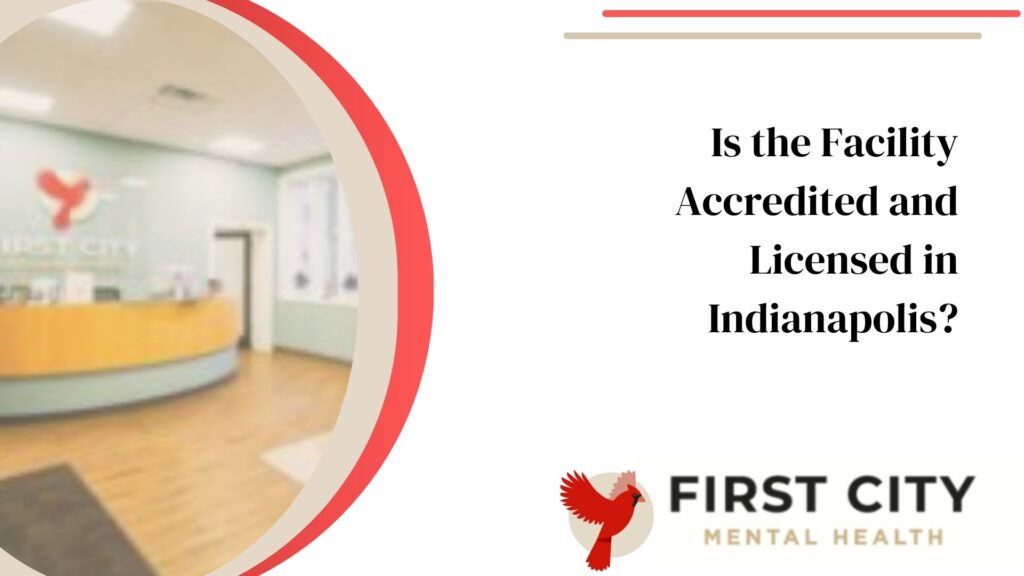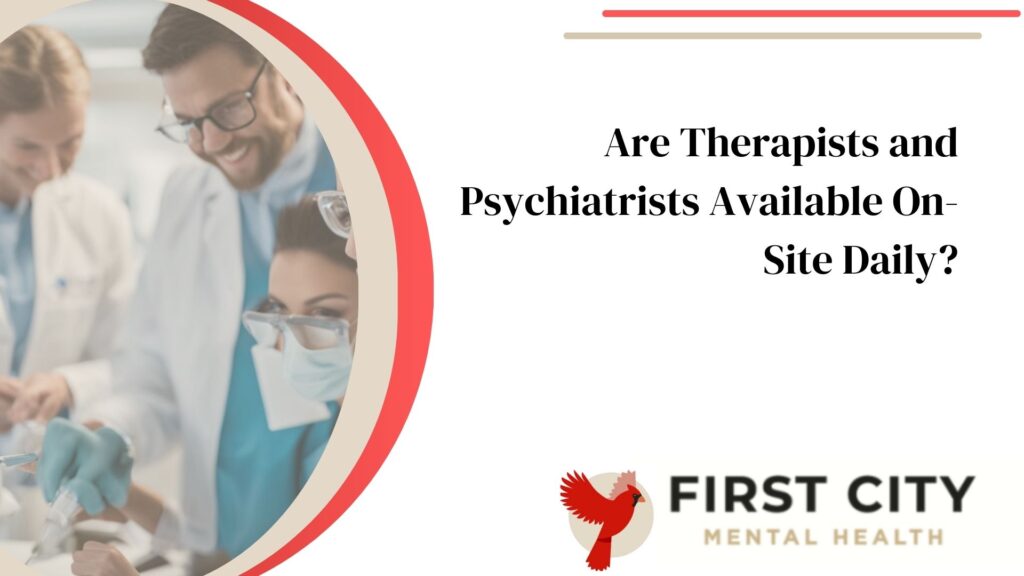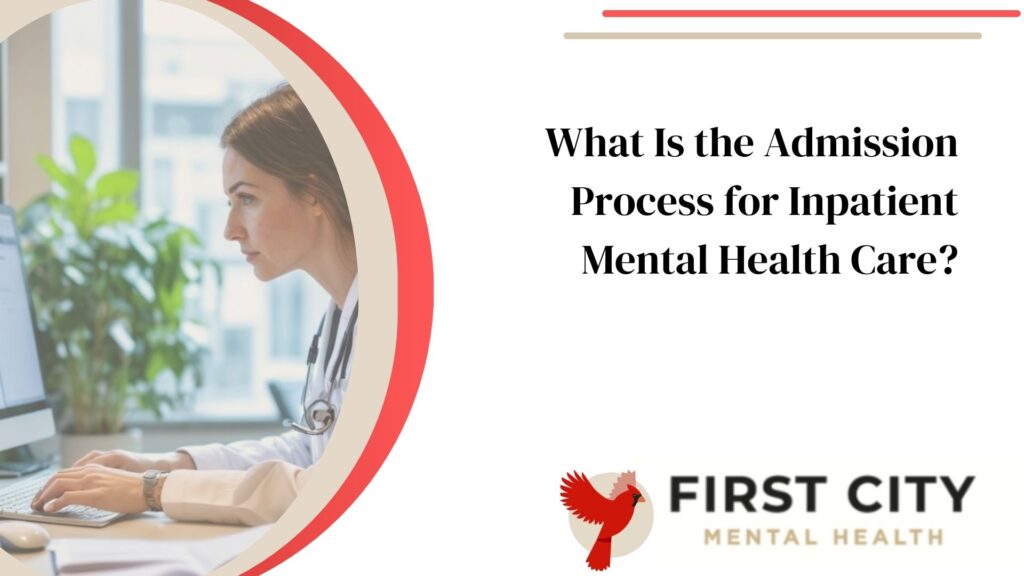
How Are Treatment Plans Customized in Adult Intensive Outpatient Program in Indianapolis?
July 15, 2025
How to Enroll in an Intensive Outpatient Program in Indianapolis?
July 20, 2025Identifying the optimal inpatient mental health facilities in Indianapolis can be a significant move for individuals needing assistance. It’s essential to select the perfect location that fulfills your requirements or those of a loved one.
Various options are prevalent in Indianapolis, but being aware of the right inquiries can create a significant impact. An essential fact to remember is that all facilities don’t provide identical services or care standards. This piece will assist you with critical inquiries to guarantee your choice among the top inpatient mental health facilities in Indiana.
You will understand the attributes that distinguish a facility from others. Continue reading for further information.
Key Takeaways
- Verify the mental health facility in Indianapolis has accreditation and licensure, confirming adherence to quality care standards.
- Determine the particular mental health conditions the facility specializes in to ensure their proficiency matches your requirements.
- Investigate the staff-to-patient ratio. A favorable ratio indicates more individualized attention and care for patients.
- Confirm the availability of therapists and psychiatrists for daily support and to effectively modify treatments.
- Understand the range of therapies provided, ensuring a broad-based approach suitable for varied needs.
What Services Does the Inpatient Mental Health Facility Offer?
Inpatient mental health in Indianapolis offers a variety of services adapted to individual requirements. These establishments utilize evidence-based or science-based therapy techniques, ensuring effectiveness in supporting patients on their journey to recovery.
They offer different types of treatments, including cognitive-behavioral therapy (CBT), mindfulness practices, and medication management. These strategies aim to treat both the symptoms and underlying causes of mental health concerns.
We define success by monitoring progress in each patient’s condition, ensuring our treatment corresponds with their unique needs.
Is the Facility Accredited and Licensed in Indianapolis?

After discussing the variety of services offered by Indianapolis inpatient mental health facilities, it’s crucial to ensure that these centers meet high standards. Checking if a facility is accredited and licensed becomes vital.
For inpatient mental health facilities in Indianapolis, accreditation means they’ve passed rigorous evaluations against national standards of care. A licensed facility has the state’s approval to operate, showing they meet local regulations.
This badge of credibility guarantees that the treatment methods are evidence-based and follow a scientifically proven model.
In Indianapolis, top-notch facilities often boast accreditation from bodies such as The Joint Commission or CARF International. These endorsements tell you the center uses treatments with documented success rates, aiming for tangible improvements in patients’ lives.
Licensing also requires staff to have appropriate qualifications, ensuring skilled professionals handle your care. Before choosing an adolescent inpatient mental health facility in Indiana or any other specialized center, verifying these credentials offers peace of mind about the quality and effectiveness of their program.
What Mental Health Conditions Does the Facility Specialize In?
Understanding the best inpatient mental health facilities in Indiana conditions a facility specializes in can guide your decision. Facilities often focus on various disorders, including depression, anxiety, bipolar disorder, and PTSD. Some institutions in Indianapolis specifically cater to adolescent inpatient mental health needs.
Each condition requires targeted treatment approaches. Look for facilities that use evidence-based methods to ensure effective care. Programs should define their goals clearly and measure success appropriately.
This way, they demonstrate their effectiveness in treating specific mental health issues.
What Is the Staff-to-Patient Ratio at the Facility?
The staff-to-patient ratio plays a crucial role in adolescent inpatient mental health facilities in Indiana. A lower ratio often indicates more individualized attention for each patient.
Typically, a good facility maintains at least one staff member for every four patients. This standard ensures that patients receive adequate care and support throughout their stay.
High-quality treatment depends on effective communication between staff and patients. Facilities with qualified professionals can better meet the diverse needs of those seeking inpatient mental health treatment.
Always inquire about this ratio to determine if the facility aligns with your expectations for personalized care.
Are Therapists and Psychiatrists Available On-Site Daily?

Therapists and psychiatrists play a crucial role in inpatient mental health facilities in Indianapolis. These professionals should be available on-site every day to provide consistent care.
Daily access ensures that patients receive timely assessments and adjustments to their treatment plans. Having therapists present allows for immediate support during critical moments, enhancing the overall healing environment.
Accredited facilities typically maintain a dedicated team of licensed staff members with diverse credentials. This includes mental health nurses, social workers, psychologists, and medical doctors.
Such comprehensive coverage enables personalized approaches to various mental health conditions. Evidence-based treatments thrive when these experts collaborate closely with patients daily, fostering trust and rapport essential for recovery.
What Types of Therapies Are Offered at the Facility?
Inpatient mental health treatment facilities in Indianapolis offer various types of therapies to support recovery. These therapies cater to different needs and conditions, ensuring comprehensive treatment.
- Cognitive Behavioral Therapy (CBT) helps patients identify and change negative thought patterns. This evidence-based approach provides practical skills for managing distress.
- Dialectical Behavior Therapy (DBT) focuses on emotional regulation. Patients learn skills to cope with intense emotions and improve relationships through this structured program.
- Group Therapy promotes social interaction among patients. Participants share experiences and support each other, creating a sense of community within the facility.
- Individual Counseling allows patients to work one-on-one with therapists. This personalized attention addresses specific issues and fosters a trusting therapeutic relationship.
- Family Therapy involves family members in the treatment process. It strengthens communication and addresses dynamics that may impact the patient’s recovery.
- Art and Music Therapies offer creative outlets for self-expression. Both therapies enhance emotional well-being by allowing individuals to express feelings in non-verbal ways.
- Recreational Therapy incorporates physical activities into healing plans. Engaging in sports or leisure activities helps improve mood and physical health simultaneously.
- Mindfulness-Based Therapies focus on present-moment awareness. These practices reduce anxiety and promote relaxation through techniques such as meditation and breathing exercises.
- Trauma-Informed Care acknowledges past trauma’s role in current issues. Facilities implementing this approach create a safe environment conducive to healing.
- Medication Management ensures proper prescriptions are maintained throughout treatment. Psychiatrists evaluate effectiveness regularly, making adjustments as necessary to optimize care.
Does the Facility Provide Individual and Group Counseling?
Effective individual and group counseling constitutes a fundamental aspect of treatment in inpatient mental health facilities in Indianapolis. These facilities often provide therapeutic sessions customized to meet the unique needs of each patient.
Individual counseling allows therapists to concentrate on personal challenges, while group sessions encourage community support and shared experiences among peers.
Many inpatient mental health programs utilize evidence-based treatment methods for their therapies. This ensures that patients receive scientifically supported care aimed at improving their well-being.
Facilities typically assess success by monitoring both individual progress and overall group dynamics, ensuring treatments align with each person’s recovery goals.
What Is the Admission Process for Inpatient Mental Health Care?

The admission process for inpatient mental health facilities in Indianapolis can vary across facilities. Understanding each step helps ensure a smoother transition into treatment.
Call the facility for an initial inquiry. This call often includes a brief assessment of the individual’s mental health needs and concerns.
Complete a pre-admission evaluation. The facility conducts this evaluation to determine if their services match the individual’s needs.
Provide necessary documentation. Individuals must submit any required medical records, insurance information, and identification during this stage.
Schedule an appointment for an in-person assessment. This meeting allows staff to gain more insight into the individual’s mental health history and current situation.
Review the treatment plan options with the staff. The facility explains available programs and discusses how they align with the specific conditions being treated.
Understand the costs associated with treatment. Transparency about any fees or coverage options from insurance providers is crucial at this point.
Sign consent forms for treatment and release of information. This step ensures that all legal obligations are met before starting care. Prepare for admission by discussing logistics such as what to bring, visiting hours, and expectations during stay.
Attend orientation on arrival day at the facility. Staff will explain rules, schedules, and support systems available throughout treatment.
Begin participation in recommended therapies immediately following admission for effective integration into the program’s model of care.
This structured approach allows individuals seeking inpatient mental health facilities in Indianapolis to better understand what lies ahead as they enter treatment.
Conclusion
Choosing the best inpatient mental health facility in Indiana requires careful consideration. Ask about services, accreditation, and specialization. Assess the staff-to-patient ratio and availability of on-site therapists.
Inquire about therapy types and the admission process. These questions help you find a suitable fit for your needs.
Understanding these factors can lead to better outcomes in mental health care. Explore resources available to support your decision-making process further. Take action by asking these crucial questions today! Your mental wellness matters, so invest time into choosing wisely.
FAQs
What should I consider when choosing inpatient mental health facilities in Indianapolis?
When selecting an inpatient mental health facility, it’s crucial to evaluate the quality of care they provide. This includes their success rates, staff qualifications, and patient reviews. You might also want to inquire about the types of therapies offered and whether they cater specifically to adolescents if that applies.
Are all inpatient mental health facilities in Indianapolis the same?
No, not all facilities are alike. Some may specialize in treating specific conditions or age groups such as adolescents while others might offer a broader range of services. It’s essential to find one that best suits your needs.
How can I determine which is the best Inpatient Mental Health Facility for me or my loved ones?
Understanding what each facility offers is key here. Consider factors like treatment methods used, duration of stay required, aftercare programs available and how they handle emergencies or crises situations.
What questions should I ask before deciding on an Inpatient Mental Health Facility?
Ask about their accreditation status and licensing credentials first off; this ensures you’re dealing with a legitimate institution offering standardized care levels. Also inquire about therapy options available – both individual & group sessions – along with any additional support services for families involved.






